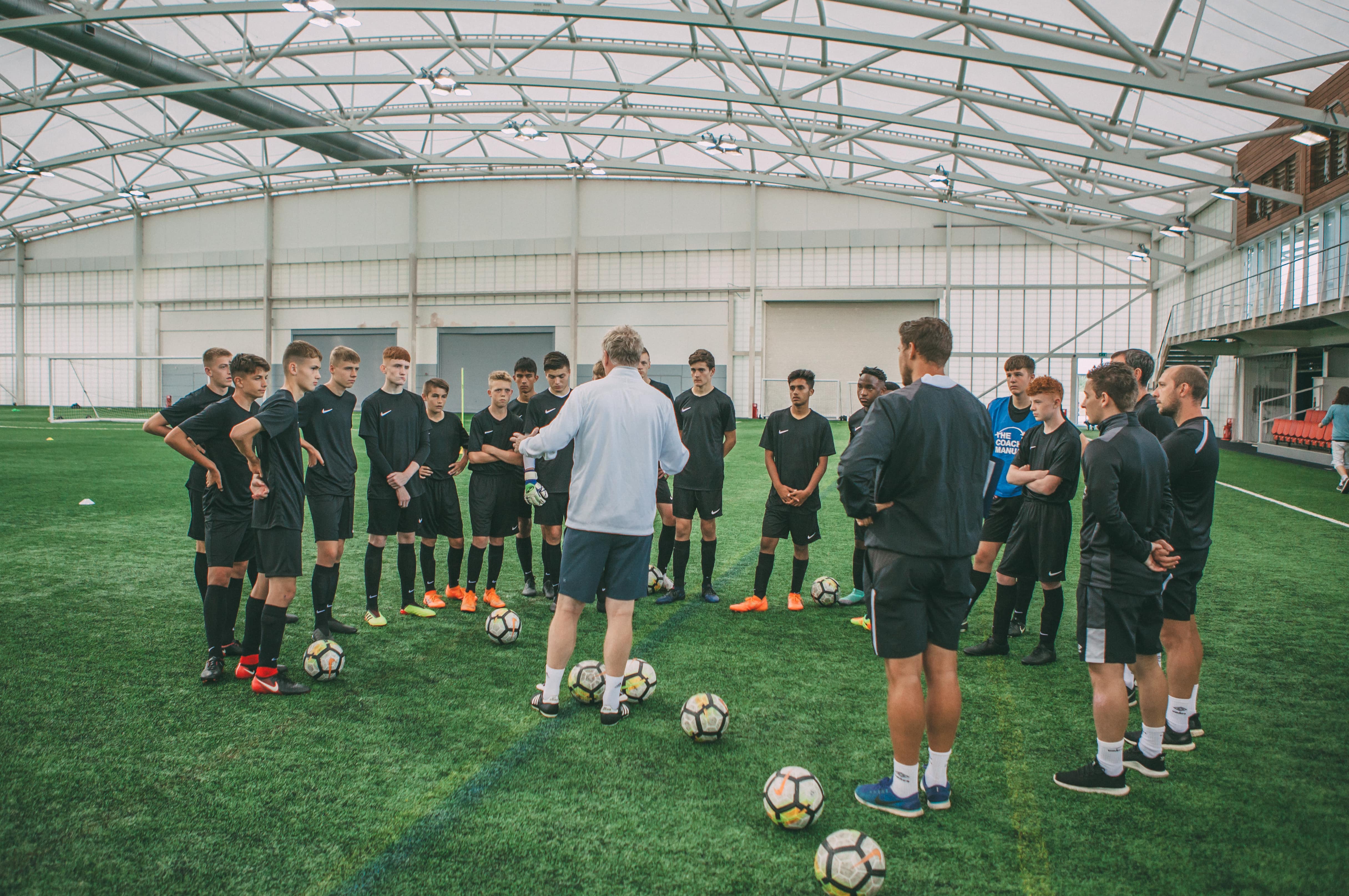In the fast-paced, results-focused world of soccer, the idea of implementing a coaching philosophy is easy to dismiss. We’ve heard all the common complaints before – things like:
- It’ll take too much work
- I don’t understand the purpose
- It won’t translate to the pitch
But a coaching philosophy is no longer a nice-to-have. According to a landmark study from the European Club Association, two-thirds of clubs have a coaching philosophy, while three-quarters of academies have a well-defined development vision. If you don’t implement your own, you’ll be left behind.
Fortunately, with The Coaching Manual, defining and introducing a coaching philosophy becomes far simpler. Read on to find out about practical philosophies that work in the real world, and how our suite of tools can support the development of your own approach to the game.
What is a coaching philosophy?
First things first, it’s important to understand what we’re referring to here.
Rather than an abstract notion about how “taking part is more important than winning” (or similar), a coaching philosophy lays out the founding principles upon which your players are coached. It should span all age levels within your club or academy, allowing for clear progression from one team to the next.
Organisations with well-defined coaching philosophies will consistently develop better players, because those players intrinsically understand what’s expected of them. The alternative is a group of teams that play under the same banner, but have little else in common.
4 coaching philosophies you can introduce at your club
Of course, introducing a new coaching philosophy isn’t an easy process. It won’t be achieved overnight. And you’re likely to face a few challenges along the way.
But the results are worth it. If you need a little inspiration, check out these examples of clubs that have famously enjoyed success through forging their own paths. Each developed a coaching philosophy that fit their needs, and stuck with it regardless of results on the pitch.
Barcelona: The best time to win the ball back is NOW
To the untrained eye, the most important element of Barcelona’s play is their unparalleled ability to maintain possession, forcing the opposition to lose their structure and tire themselves out chasing shadows.
In reality, that’s only the second part of the Barça conundrum. The key factor is actually their intense focus on winning the ball back as soon as they lose it.
Their opponents are already drained – physically and psychologically – having spent much of the game vainly attempting to regain possession. Even when they do lose the ball, this gives the Catalan club a fantastic opportunity to win it back immediately.
Having won control of the ball again, Barcelona players are encouraged to quickly play a simple, low-risk pass, giving them the best chance of keeping hold of it. The only exception to this rule is if there’s a clear chance of a counter-attack or an immediate opportunity to score.
Tottenham Hotspur: The 10-minute rule
The Spurs academy introduced the so-called “10-minute rule” as the starting point of all training sessions, regardless of age level.
It’s a simple premise. Each session kicks off with a 10-minute period in which players focus on a specific weakness, which must be agreed with the coaching staff. For instance, a left-footed goalkeeper might work on playing out from the back with their right foot.
It might not sound like much, but over the course of a season this adds up to a significant focus on addressing technical flaws. Older players have six training sessions per week, so this equates to 43 hours of additional work on weaknesses throughout a 43-week season.
Hoffenheim: Encouraging progressive independence
Despite being based in a village with a population of 3,000 people, Die Kraichgauer famously climbed from the fifth tier of German football to the heights of the Bundesliga in just eight seasons.
Of course, the financial clout of their billionaire owner Dietmar Hopp played a big part. But money alone is no guarantee of success.
Another key factor was their coaching philosophy, based on cultivating independence, creativity and motivation in youth players. Coaches are tasked with transforming athletically gifted youngsters into creative players with superb speed, reactions, decision-making and professional potential.
At each level, players are given more and more responsibility to make on-field decisions. Rather than being whistle-blowing taskmasters, coaches are on hand to encourage creativity and offer support when needed.
In its Philosophy of Youth Development, the club explains: “Youth players should emerge from our training program as resilient team players with great strength of character. We also want to inspire them to be lifelong learners and to prepare them for life.”
Ajax Amsterdam: The TIPS Model
Perhaps the club with the longest history of developing talented youngsters into world-class soccer players, Ajax base their academy approach around the TIPS Model:
- Technique – the ability to control the ball
- Insight – football intelligence and decision-making
- Personality – flair, discipline and ability to play as a team
- Speed – mobility, acceleration and pace over distance
The club believes that the final two factors – personality and speed – are naturally possessed by players, whereas the other two can be ingrained through long-term development.
As Marc Grune, former Head of Youth at Ajax Cape Town, explains: “The Ajax player has to have a very high level and broad base in all technical skills; he needs to be talented, skilful, tactically clever, fast, coachable and have a good personality.
“In other words he needs to be at the highest level in all fields (also off the pitch). This means that the development must start at an early age and continue for many years to achieve these huge demands.
“The coaching for every age group becomes extremely important to lay a firm base (at the youngest level) and continually expand, nurture and develop all necessary skills to the top level.”
How The Coaching Manual can help you implement a new philosophy
There’s no point in taking the time and effort to define your approach to the game, only to abandon it after a few weeks. Fortunately, our software provides many of the tools you need to successfully implement your coaching philosophy:
- Develop bespoke curriculums spanning a whole season, allowing you to map out the long-term adoption of your approach across all teams
- Access expert content from professional academies, giving your coaching team the chance to learn from the best in the business
- Create new sessions from scratch with our session planner, designed to be as easy to use as pen and paper



